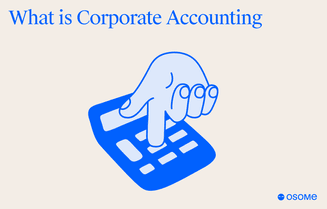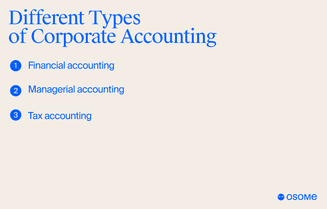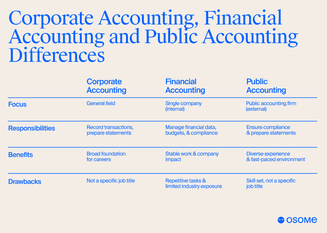What Is Corporate Accounting? A Complete Guide
- Published: 18 July 2024
- 15 min read
- Running a Business


Heather Cameron
Author
Heather is here to inform and inspire our readers. Boasting eight years in the world of digital marketing, working in diverse industries like finance and travel, she has experience writing for various audiences. As Osome’s resident copywriter, Heather crafts compelling content, including expert guides, helpful accounting tips, and insights into the latest fintech trends that will help entrepreneurs, founders and small business owners in Hong Kong take their businesses to the next level.
Corporate accounting is about recording and reporting a company’s financial activities. It helps in decision-making and complying with regulations. This article covers its principles and key practices.
Key Takeaways
- Corporate accounting refers to the process of recording, summarising, and reporting financial accounts to support management, strategic planning, and legal and regulatory compliance.
- The main financial statements in corporate accounting are the balance sheet, income statement, and cash flow statement, which give insight into a company’s financial position, performance, and flows to inform decision-making and stakeholder communication.
- Corporate accounting involves financial, tax, and managerial accounting, which serve different purposes for external financial reporting, internal decision-making, and tax compliance to ensure overall financial management and strategic planning.
What Is Corporate Accounting?
Corporate accounting is the area of accounting that deals with the financial activities of a particular company. It’s the process of recording, summarising, and reporting financial information. This information is then shared with the business stakeholders. The main aim is to provide financial information that is accurate and timely to support decision-making and planning. Corporate accounting involves preparing financial statements, general ledgers, bookkeeping, financial planning, asset management and tax records.
No matter your business size or accounting needs, Osome offers comprehensive accounting services. We specialise in ecommerce businesses, ensuring your finances are under control and empowering informed growth.

Nowadays, businesses use advanced software to make these processes easier and more accurate. At the end of the day, the importance of corporate accounting is that it's the foundation for good management, growth, and sustainability by providing the right financial information.
Corporate accounting meaning
Corporate accounting gathers, analyses, classifies, validates, interprets, and presents financial data. Company accounting involves recording financial transactions, bookkeeping, and preparing these financial accounts.
Also, corporate accounting has various books of accounts and financial results to be analysed to understand the company's performance.
Key financial statements
In business accounting, key financial statements give you an overview of your company’s position, performance, and flows so you can make decisions and talk to stakeholders. These include:
- The balance sheet, which outlines a company’s assets, liabilities, and equity
- The income statement, which details revenues and expenses
- Cash flow statements track the flow of cash in and out of the business.
Together, these statements offer insights into a company’s financial performance, liquidity, and solvency, enabling stakeholders to make informed decisions. Corporate accounting involves managing financial risks and preparing these statements as part of their financial reporting duties.
The Importance of Corporate Accounting
The significance of corporate accounting is important. It’s key to the smooth running and management of businesses by:
- Making informed decisions
- Planning strategy
- Growing
- Long term sustainability
By providing financial transparency, the chief financial officer plays a big part in corporate accounting and builds trust and credibility with stakeholders, which is vital for investors and access to funding.
Also, corporate accounting does the following:
- Provides financial information for decision-making and planning.
- Helps businesses with compliance and regulatory requirements and maintain legal and operational integrity.
- Is the foundation upon which businesses build their financial strategy and growth plans.
Financial transparency and reporting
Financial transparency and reporting are part of accounting and help build trust and credibility with stakeholders. Accurate financial accounts give you a clear view of the company’s financial performance and cash flow which is key to keeping investors and getting capital.
Transparent financial reporting, as emphasised by the FASB, ensures:
- Consistency and reliability in financial reporting
- Attracting investments
- Fostering positive relationships with key stakeholders Ultimately, corporate accounting provides a mechanism for corporate entities to be accountable to their shareholders, creditors, and regulatory bodies.
Strategic decision making
Good financials from the corporate accounts help with strategic decision-making. This info allows management to measure profitability, liquidity and other key performance indicators to make informed strategic decisions.
Corporate accounting helps with investment and resource allocation decisions so businesses can optimise their financial performance and achieve their long-term goals. Corporate accounting provides the info for management decisions and strategic planning and is key to the overall success and sustainability of the business.
Compliance with regulatory requirements
Compliance with legal and regulatory requirements is a fundamental aspect of company accounting. It means companies comply with statutory and regulatory requirements like tax laws and accounting standards like GAAP and IFRS and industry-specific regulations. It also means setting up compliant accounting structures, coordinating with local teams and recording income, expenses and taxes.
Keeping up with changing accounting standards and regulations takes time and effort, but it’s necessary to avoid legal consequences and maintain operational integrity. That’s where corporate accounting helps businesses risk management and get accurate financial reporting, following international financial reporting standards.
Types of Corporate Accounting
Corporate accounting has different specialisms to cater for different financial needs. The types of corporate accounting are:
- Financial accounting, which summarises transactions for external purposes
- Managerial accounting, which does cost analysis and budgeting for internal purposes
- Tax accounting, which is tax planning and compliance
Each one has its own role in the overall financial management of the company, so all aspects of the business’s financial operations are covered.

Together, they give a full picture of the company’s financial health and strategy.
Financial accounting
Financial accounting mainly covers the following:
- Summarising financial transactions for external purposes for investors and regulatory bodies
- Recording, summarising and reporting transactions from business operations for a specific period
- Giving a clear and accurate view of the company’s financial position to external stakeholders
This transparency is key to maintaining investor confidence and meeting legal and regulatory requirements.
Managerial accounting
Managerial accounting is key to internal business decisions. It’s cost analysis, budgeting and business decision support. Managerial accountants give product costs and cost allocation information to internal decision makers.
Budgeting, forecasting and planning software is more critical than ever for detailed financial analysis and strategy. And methods like activity based costing help track and allocate costs to products, services or projects and gives valuable information for managerial decisions.
Tax accounting
As a specialism within company accounting, this focuses on tax planning and tax compliance. It involves calculating taxable income, preparing tax returns and ensuring businesses comply with all tax regulations. Tax accountants need to stay up to date with tax laws to minimise tax liabilities and avoid legal issues.
Good tax accounting can make a big difference to a company’s financial health by reducing tax and compliance.
Examples of corporate accounting
Day-to-day business operations are examples of corporate accounting. This includes:
- To prepare financial statements
- Bookkeeping
- General ledgers
- Financial planning
- Asset management
All these are corporate accounting.
These processes are key to providing accurate financial information for decision making and regulatory compliance. By having robust accounting systems businesses can have financial transparency and operational efficiency.
Main Processes in Corporate Accounting
Recording financial transactions, preparing financial statements, and managing accounts payable and receivable constitute the primary processes in corporate accounting. These activities are fundamental to maintaining accurate financial records and ensuring the financial health of the company.

Bookkeeping involves the following activities:
- Detailed recording of financial transactions
- Compiling data from ledgers to prepare financial statements
- Managing accounts payable and receivable to ensure financial obligations are met and maintain healthy cash flows.
Recording financial transactions
Recording financial transactions correctly and on time is key to accurately tracking a company's financial performance. This is done using a double-entry system where each transaction is recorded with at least 2 entries: a debit and a corresponding credit. Whether using accounting software or a manual logbook, timing and accuracy of recording transactions are key.
And reconciling bank statements with bank transfers and other recorded transactions ensures accuracy of financial records and identifies any variances. This foundation process supports all other accounting activities and financial data integrity.
Preparing financial statements
Preparing financial statements involves the following steps:
- Gathering data from various ledgers
- Ensuring all financial transactions are accounted for
- Sorting transactions
- Journalising
- Preparing an adjusted trial balance
This is part of standard accounting practices.
The financials give you a snapshot of the company. Accountants have a big job to ensure these are accurate and compliant with accounting standards.
Managing accounts payable and receivable
Managing accounts receivable and accounts payable is a big part of company accounting. It involves:
- Paying off outstanding debts
- Receiving, verifying, recording and issuing payments for invoices
- Tracking invoices
- Paying suppliers on time
Accounts receivable involves generating and sending invoices to customers, tracking outstanding invoices and reconciling incoming and past due payments. Good management of accounts receivable means regular cash flow and dealing with bad debts and default accounts.
Together, these two processes keep the company financially healthy and liquid.
Corporate Accounting Principles and Standards
To be consistent, accurate and transparent in financial reporting, corporate accounting follows established principles and standards. GAAP and IFRS are the frameworks used by accountants globally. These standards are key to keeping financial data clean and financials comparable across companies.
The Financial Accounting Standards Board (FASB) plays a significant role in setting these standards in the United States. By adhering to these principles, corporate accounting helps build trust and credibility with stakeholders.
Focus on your core business strategy – let Osome handle the complexities of corporate accounting. Our comprehensive services ensure your finances are GAAP-compliant and empower data-driven decision-making for sustainable growth. Contact us today!
Generally Accepted Accounting Principles (GAAP)
Generally Accepted Accounting Principles (GAAP) is the standard framework for accounting and reporting in the US. The core principles are the accrual principle (recognise revenue and expenses when earned or incurred) and the conservatism principle (be conservative in financial reporting). Publicly traded companies must file GAAP-compliant financial statements to maintain their stock exchange listings, so those statements must be complete, consistent and comparable.
By following GAAP, companies can give stakeholders reliable financial information to make better investment decisions and comply with regulations.
International Financial Reporting Standards (IFRS)
IFRS is used in many countries to ensure consistency and comparability in financial reporting. Unlike GAAP, IFRS doesn’t allow the use of the last in, first out (LIFO) inventory cost method, which can lead to differences in financial reporting.
IASB regularly updates IFRS to respond to the changing financial landscape, so it’s a dynamic and adaptive framework. This standards-based approach allows companies across different jurisdictions to have transparency and reliability in their financial statements and, hence, global investor confidence.
Financial Accounting Standards Board (FASB)
The Financial Accounting Standards Board (FASB) is responsible for:
- Establishing and improving accounting and reporting standards in the United States
- Issuing statements, guidelines, and interpretations that ensure consistency, transparency, and comparability in financial reporting
- Public comment and stakeholder input should be involved in the process to make it transparent and inclusive.
One of the primary outcomes of FASB’s work is the development of GAAP, which provides a solid framework for company accounting practices.
The Role of Corporate Accountants
Analysing and interpreting accounting records, financial statements, and offering financial advice (including accounting tips for improved record-keeping and cost management) are the key roles of a corporate accountant. They also review statements prepared by others to ensure accuracy and compliance with company accounting standards and legal and regulatory requirements. By giving advice on how to record costs and other financial data, corporate accountants support decision-making and operational efficiency.
Also, financial analysis and key performance indicators (KPIs) allow us to measure organisational performance. This will help to understand the company’s financial health and overall performance. They also track costs associated with sustainability initiatives and prepare necessary disclosures.
Daily responsibilities
The daily responsibilities of corporate accountants include:
- Bookkeeping: recording and filing all financial transactions, making sure receipts and invoices are in order
- Payroll: employee salaries, benefits and deductions
- Reconciliations: comparing financial records to make sure everything adds up and fix any discrepancies
- Invoicing: creating and sending invoices to clients or customers
- Month-end closings: completing financial statements and reports at the end of the month
These are the basics to keeping financial records in order and the company running smoothly.
Financial analysis and reporting
Financial analysis and reporting are at the heart of what accountants using corporate accounting systems do. They review financials and KPIs to support investment decisions and planning. This means preparing detailed financial reports that give insight into the company’s financials.
Regular reviews and audits of financials ensure the info is correct and compliant. By reading financial reports, corporate accountants help management make decisions that drive the business.
Risk management and internal audits
Corporate accounting is key to risk management, as it identifies and manages financial risks like credit risk, market risk, and liquidity risk management. This is done through internal controls, conducting internal audits and accounting standards.
Internal auditing is a critical process to ensure financial accuracy and to identify gaps. Big data analytics in auditing can help to increase sample size, detect fraud better and make better decisions.
Corporate Accounting vs. Financial Accounting vs. Public Accounting
Although related to the accounting field, corporate accounting, financial accounting, and public accounting are different and have different career paths. Corporate accounting is internal to a company, financial accounting is external reporting, and public or private accounting is providing accounting services to various clients, including audits and tax prep.
Knowing this is important if you are in accounting or want to understand how a business works.
The best choice depends on your interests and career goals:
- Corporate accounting: Ideal if you prefer stability, a predictable work environment, and contributing to a specific company's success.
- Public accounting: A good fit if you enjoy variety, a fast-paced environment, and the challenge of working with different clients.
- Financial accounting: Provides a strong foundation for various accounting careers, allowing you to explore both corporate and public accounting later.

Corporate accounting
Corporate accounting is all about the internal financials of a company. It’s about recording transactions, preparing financials and managing data to support the business and strategy. These accountants are in-house and provide insight to inform internal decision-making and regulatory compliance.
The benefits are detailed analysis and better resource allocation. Drawbacks are managing large amounts of data.
Financial accounting
Financial accounting is for external stakeholders. It’s about preparing reports like balance sheets, income statements and cash flow statements to tell the story of the company’s financial position and performance. Financial accountants make sure these reports adhere to accounting practices and accounting standards like GAAP or IFRS so that financial reporting is transparent and consistent.
The benefits are increased investor confidence and regulatory compliance, but the drawbacks are the strictness of the reporting requirements and the focus on past data.
Public accounting
Public accounting is providing services such as audits, tax and consulting to multiple clients. Public accountants work for an accounting department and serve businesses, individuals and government entities. The perks are many career opportunities and getting to work with different clients; the cons are long hours and meeting client deadlines.
Public accountants are the watchdogs of financial information across all industries.
Practical Applications of Corporate Accounting
A host of practical applications of corporate accounting prove vital for the success of a business. It aids in controlling costs and improving operational efficiency by using cost accounting techniques to track and allocate costs. Corporate accounting provides essential insights for optimising pricing, budgeting, and resource allocation strategies.
Transparent financial reporting is crucial for fostering trust and open communication in businesses. It allows them to manage stakeholder expectations, address concerns, and build long-term relationships. These practical applications demonstrate the importance of corporate accounting in achieving financial stability and growth.
Even the most established businesses can benefit from expert help. Osome offers comprehensive accounting services tailored to various businesses. Contact us today and focus on what you do best – running your business!
Cost control and efficiency
Corporate accounting covers cost control and efficiency. By categorising costs into fixed and variable costs, we can see where we’re overspending and put cost controls in place. Some cost control strategies are:
- Negotiate better with suppliers
- Save energy
- Reduce waste and improve production processes
- Simplify admin
- Technology to automate and reduce labour costs
Identifying and controlling bottlenecks in processes will also reduce costs and increase profit.
The cost-volume-profit analysis will show us where we can save and where we can improve. Corporate accounting helps us achieve our spending and profit targets through risk management.
Performance evaluation
Through interpreting financial data and key performance indicators (KPIs), corporate accounting enables performance evaluation. This helps organisations make informed decisions and be more efficient. By reviewing cost per unit and other financial metrics businesses can make informed pricing decisions and be profitable. This helps management see the financial health of the company and make strategic decisions to improve performance.
Regular reviews keep you on track with your financial goals and can address any issues that come up.
Stakeholder communication
Stakeholder communication, when done correctly, is a key part of corporate accounting. Financial statements like balance sheets, income statements, and cash flow statements provide financial data to stakeholders, as well as transparency and trust. Clear and consistent financial communication keeps shareholders, creditors, suppliers, customers and employees happy.
By being transparent in financial reporting businesses can manage stakeholder expectations, address concerns and build long term relationships. This increases the overall credibility of the company.
Summary
In short, corporate accounting is a must-have in today’s business world. It covers financial, tax, and managerial accounting, and each plays a big role in keeping the business financially healthy and supporting decision-making. The main processes in corporate accounting, like recording transactions and financial statements and managing accounts payable and receivable, ensure financial reporting is accurate and ensures compliance and regulatory requirements. By following generally accepted accounting principles like GAAP and IFRS, corporate accountants provide reliable financial information that is transparent and builds stakeholder trust. The practical applications of corporate accounting, like cost control, performance evaluation and stakeholder communication, further emphasise its importance. Understanding and applying corporate accounting well can lead to financial stability, operational efficiency and business growth.






